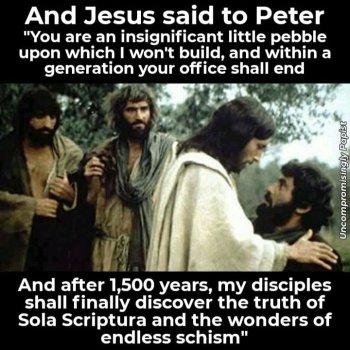You keep talking out of both sides of your mouth. Now, you are expanding the claim to include other Apostles, pretending like there is not the word for plural references, "these."
Why do you keep ignoring my question, if Peter was the rock, why did the apostle Paul call Christ the ROCK (1 Corinthians 10:4), the only FOUNDATION (1 Corinthians 3: 11), and Peter himself called Christ the CHIEF CORNER STONE (1 Peter 2:6)?
Why does Paul call Peter "Cephas" (Aramaic for Rock) 6 times? Cephas is his new name, it's not a metaphor. A chief cornerstone is a metaphor, unless you want to argue the "chief corner stone" is a literal cornerstone.
Why does Jesus call Peter "Cephas" in John 1:42???
It's too bad you can't see the absurdity of your arguments.
The Church is an extension of the Incarnation, united by the Eucharist. Paul focuses more on the Eucharist in 1 Corinthians than he does about the Church.
Matt. 26:26; Mark. 14:22; Luke 22:19-20 – the Greek phrase is
“Touto estin to soma mou.” This phraseology means “this is actually” or “this is really” my body and blood.
1 Cor. 11:24 –
the same translation is used by Paul – “touto mou estin to soma.” The statement is “this is really” my body and blood. Nowhere in Scripture does God ever declare something without making it so.
1 Cor. 10:16 – Paul asks the question, “the cup of blessing and the bread of which we partake, is it not an actual participation in Christ’s body and blood?” Is Paul really asking because He, the divinely inspired writer, does not understand? No, of course not. Paul’s questions are obviously rhetorical. This IS the actual body and blood. Further, the Greek word “koinonia” describes an actual, not symbolic participation in the body and blood.
1 Cor. 10:18 – in this verse, Paul is saying we are what we eat. We are not partners with a symbol. We are partners of the one actual body.
1 Cor. 11:23 – Paul does not explain what he has actually received directly from Christ, except in the case when he teaches about the Eucharist. Here, Paul emphasizes the importance of the Eucharist by telling us he received directly from Jesus instructions on the Eucharist which is the source and summit of the Christian faith.
1 Cor. 11:27-29 – in these verses, Paul says that eating or drinking in an unworthy manner is the equivalent of profaning (literally, murdering) the body and blood of the Lord. If this is just a symbol, we cannot be guilty of actually profaning (murdering) it. We cannot murder a symbol. Either Paul, the divinely inspired apostle of God, is imposing an unjust penalty, or the Eucharist is the actual body and blood of Christ.
1 Cor. 11:30 – this verse alludes to the consequences of receiving the Eucharist unworthily. Receiving the actual body and blood of Jesus in mortal sin results in actual physical consequences to our bodies.
1 Cor. 11:27-30 – thus, if we partake of the Eucharist unworthily, we are guilty of literally murdering the body of Christ, and risking physical consequences to our bodies. This is overwhelming evidence for the Real Presence of Christ in the Eucharist. These are unjust penalties if the Eucharist is just a symbol.
1 Cor. 12:13 – we “drink” of one Spirit in the Eucharist by consuming the blood of Christ eternally offered to the Father.
1 Cor. 5:7 – Paul tells us that the Lamb has been sacrificed. But what do we need to do? Some Protestants say we just need to accept Jesus as personal Lord and Savior.
1 Cor. 5:8 – But Paul says that we need to celebrate the Eucharistic feast. This means that we need to eat the Lamb. We need to restore communion with God.
1 Cor. 10:16 – Paul’s use of the phrase “the cup of blessing” refers to the Third Cup of the seder meal. This demonstrates that the seder meal is tied to Christ’s Eucharistic sacrifice.
1 Cor. 10:16 – “the cup of blessing” or Third cup makes present the actual paschal sacrifice of Christ, the Lamb who was slain.
1 Cor. 10:18 – Paul indicates that what is eaten from the altar has been sacrificed, and we become partners with victim. What Catholic priests offer from the altar has indeed been sacrificed, our Lord Jesus, the paschal Lamb.
1 Cor. 10:20 – Paul further compares the sacrifices of pagans to the Eucharistic sacrifice – both are sacrifices, but one is offered to God. This proves that the memorial offering of Christ is a sacrifice.
1 Cor. 11:26 – Paul teaches that as often as you eat the bread and drink the cup, you proclaim the Lord’s death. This means that celebrating the Eucharist is proclaiming the Gospel.
1 Cor. 10:21 – Paul’s usage of the phrase “table of the Lord” in celebrating the Eucharist is further evidence that the Eucharist is indeed a sacrifice. The Jews always understood the phrase “table of the Lord” to refer to an altar of sacrifice. See, for example, Lev. 24:6, Ezek. 41:22; 44:16 and Malachi 1:7,12, where the phrase “table of the Lord” in these verses always refers to an altar of sacrifice.
Most Protestant churches don't even have altars, so no sacrifice, no priesthood and no unity.








